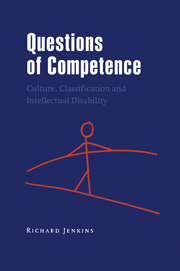Book contents
- Frontmatter
- Contents
- List of contributors
- 1 Culture, classification and (in)competence
- 2 Mental disability in the United States: an interactionist perspective
- 3 (In)competence in America in comparative perspective
- 4 Risk, resilience and competence: parents with learning difficulties and their children
- 5 Constructing other selves: (in)competences and the category of learning difficulties
- 6 Work, opportunity and culture: (in)competence in Greece and Wales
- 7 Slow cookers and madmen: competence of heart and head in rural Uganda
- 8 States and categories: indigenous models of personhood in northwest Greenland
- 9 Learning to become (in)competent: children in Belize speak out
- 10 Towards a social model of (in)competence
- Bibliography
- Index
1 - Culture, classification and (in)competence
Published online by Cambridge University Press: 16 January 2010
- Frontmatter
- Contents
- List of contributors
- 1 Culture, classification and (in)competence
- 2 Mental disability in the United States: an interactionist perspective
- 3 (In)competence in America in comparative perspective
- 4 Risk, resilience and competence: parents with learning difficulties and their children
- 5 Constructing other selves: (in)competences and the category of learning difficulties
- 6 Work, opportunity and culture: (in)competence in Greece and Wales
- 7 Slow cookers and madmen: competence of heart and head in rural Uganda
- 8 States and categories: indigenous models of personhood in northwest Greenland
- 9 Learning to become (in)competent: children in Belize speak out
- 10 Towards a social model of (in)competence
- Bibliography
- Index
Summary
This collection of essays is about the social categorisation of individuals as ‘incompetent’. Juxtaposing discussions of ‘incompetence’ and ‘competence’ in different cultural settings, the contributors hope to encourage readers to question the nature and status of these notions. Although, for stylistic reasons, I will not retain the inverted commas around these and similar words throughout this chapter, they are meant to indicate their contested and problematic character. Nor is it our intention to render them less contested or problematic: quite the reverse, our aim is to provoke questions and raise creative doubts.
This enterprise builds on the small amount of work that has adopted a comparative perspective on ‘mental retardation’ (Dybwad 1970; Edgerton 1970; Kidd 1970; Manion and Bersani 1987; Zevenbergen 1986) and follows on the heels of a session discussing these issues at the 1994 meeting of the American Anthropological Association. It is also part of the trend that has produced a recent collection of papers offering a cross-cultural perspective on disability, in its widest sense (Ingstad and Whyte 1995). Thinking about these topics in the widest of contexts is increasingly being recognised as vital, if we are to understand them better (cf. Barnes 1996).
(In)competence
‘Competence’ is the capacity or potential for adequate functioning-in-context as a socialised human. It is generally taken for granted and axiomatic. In this definition, capacities, potentials and adequacies are to be understood as socially constructed and ascribed – and hence locally variable – rather than ‘objective’ attributes of persons.
- Type
- Chapter
- Information
- Questions of CompetenceCulture, Classification and Intellectual Disability, pp. 1 - 24Publisher: Cambridge University PressPrint publication year: 1999
- 6
- Cited by



